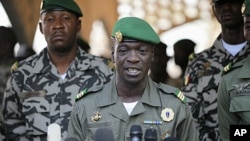DAKAR - Human Rights Watch (HRW) says soldiers loyal to the leader of a March 22 coup in Mali abducted and tortured dozens of security personnel thought to be linked to an April 30 counter-coup attempt. At least 20 of those men, the rights group says, are feared dead.
The leader of the March military coup, Captain Amadou Sanogo, has retreated from the political limelight to the Kati military camp outside Bamako, but the international community continues to accuse him of meddling in the country's affairs and impeding the progress of the interim civilian government, which took power in April.
The New York-based rights group says Sanogo and security forces loyal to him led a crackdown against at least 80 soldiers, police officers and gendarmes who allegedly tried to reverse the coup on April 30.
"In response to the counter-coup attempt, troops loyal to Amadou Sanogo and the CNRDR [military junta] rounded up those that they believed were involved in the coup," said Corinne Dufka, HRW's West Africa researcher. "[They] brought them to at least two bases, subjected them to some horrific forms of torture and then, according to witnesses within Kati camp, took out 20 of them, executed them and likely deposited their bodies in a mass grave."
HRW says it spoke to eight witnesses who described torture that included severe beatings to the point of unconsciousness, cigarette burns, suffocation, denial of food and water, and reports of four detained men being forced to sodomize each other. Two witnesses described seeing Captain Sanogo at the Kati camp when torture was taking place; one witness described seeing Sanogo threaten others and kick a detainee who has since disappeared.
A Sanogo spokesperson has not yet responded to VOA requests to comment on the allegations, and Sanogo has not spoken extensively to the media since mid-May.
While Mali's interim government is authorized to arrest and question those suspected of involvement in any counter-coup attempt, Sanogo supporters, says Dufka, have no such authority and appear to be acting outside the law.
"It really brings into question whether the prime minister, the minister of justice and the heads of the security services, which legitimately should respond to this [countercoup attempt], are able to demonstrate the power and the authority that they should," she said.
Family members of those detained have been taking to the streets in protest, demanding to know what happened to their loved ones.
According to Dufka, the Ministry of Justice, Amnesty International and others were instrumental in getting 43 detainees transferred from Kati camp on June 24, when they were taken to the gendarmerie (military police station) where they should have been detained in the first place.
Human Rights Watch believes efforts by local media to look into disappearances, reports of a mass grave and the treatment of detainees, are related to recent attacks on journalists.
"[Journalists] have been intimidated," said Dufka. "They have been called in for questioning on at least two occasions. They have been bundled into cars and beaten up and left on the outskirts [of Bamako], and we believe that some of these actions are directly related to trying to suppress the information from coming out."
Mali, once considered one of Africa's model democracies, has been in chaos since soldiers angry over the government's poor response to an armed rebellion in the North mutinied and overthrew the country's elected president.
Al-Qaida-linked Islamist militants and Tuareg rebels now control the northern half of the country, while Bamako remains locked in political uncertainty.










